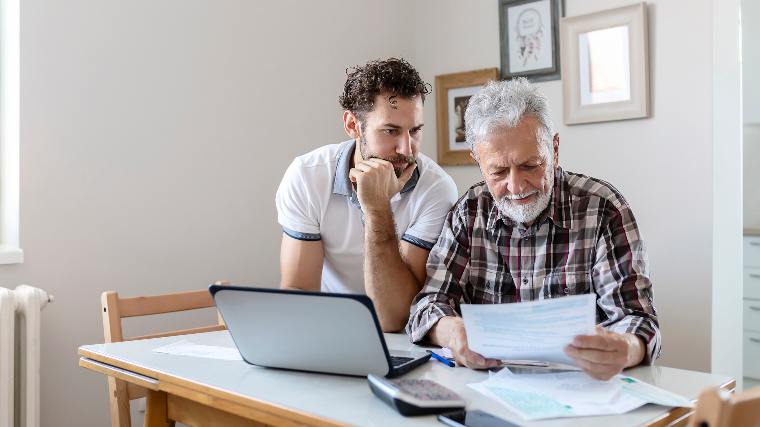Does Power of Attorney Make You Responsible for Someone Else's Debts?

The following is provided for informational purposes only and is not intended as legal advice.
A signed power of attorney (POA) gives you ability to manage the financial and legal affairs of a loved one or trusted friend. It can be especially useful if you have a family member who can no longer manage their own affairs and you've been chosen to help them make decisions and handle day-to-day business.
But what are your responsibilities as a POA? And if you're serving as the POA for someone who can't make payments on debts or other bills, do you have to make those payments personally?
Power of Attorney Does Not Make You an Account Holder
A reader, who was serving as POA for her mother, was told by a debt collector that if the mother couldn't make payments, then as the POA, she would need to. She then asked us, "Is that true?"
First thing first – if you're not named anywhere on the accounts in question, chances are good that you're not personally responsible for repaying them. If you're a cosigner, then yes, you would be responsible, but that has nothing to do with being a power of attorney. So if you're serving purely as a POA for someone, their debts are your concern (because you need to decide how they're handled), but they aren't your personal responsibility to repay.
Power of Attorney Gives You the Right to Make Financial Decisions
Even though you don't need to pay the principal's bills out of your own pocket, you do have some important financial responsibilities. Through the POA, you serve as an agent and fiduciary for the principal. That role makes you responsible for properly managing their money, assets, and debts. And that includes decisions on how to handle their debts.
Your choices will have an impact on the life of the principal, so it's important that you understand those choices and act appropriately.
Basic Duties of an Attorney-in-Fact
According to the guidelines created by the Consumer Financial Protection Bureau, an attorney-in-fact (which is what you become after the POA is signed) has four basic duties. They must:
- Act in the principal’s best interest;
- Manage the principal’s money and property carefully;
- Keep the principal’s money and property separate from their own; and
- Keep good records of all transactions made on the principal’s behalf.
So if the principal has unpaid debts, what’s in their best interest?
If they have the funds necessary to repay these debts without causing an undue financial burden or potentially putting themselves at risk, then using those funds to repay the debts is probably the fastest, easiest way to resolve the issue.
But what if they don't have the money?
Consequences of Choosing Not Pay a Debt
If you simply stop making payments and cease communications with a creditor you should expect the following:
- Accounts will go delinquent
- Accounts will eventually be charged off
- Charged off accounts may be sold to a third party debt collector
- Debt collector will likely attempt to contact the responsible party (the principal) via mail and telephone
- Credit score of account holder will likely decline due to delinquencies and charge-offs
- Collectors may take legal action and sue account holder for defaulted debt
- Account holder may have a garnishment placed against future earnings
As attorney-in-fact, you're tasked with understanding the consequences and picking the path that makes the most sense for the principal. For an elderly parent, for example, the threat of a poor credit score or potential garnishment may not mean that much. In fact, some older principals may even be what's called "judgment proof", in which case it's not in their best interests to make payments.
And for yourself, again, the POA doesn't link you to the principal's debts. If you wouldn't be legally responsible without the POA, you almost certainly won't be legally responsible with it.
Ultimately, if the dispute is around a sizeable amount of money, it may be in your best interest to speak with a qualified attorney before making any decisions. Because some sources of income (such as Social Security benefits) are protected from garnishment (to an extent), there are certain instances where account holders with limited assets and protected income are advised to stop making debt payments. An attorney is best suited to help you understand the potential consequences of nonpayment.
Always Communicate with Creditors
While you aren't financial liable, as the attorney-in-fact, you're still the point of contact for the principal's debts. Creditors have a right to attempt to collect the funds that are owed. They don’t, however, have a right to harass you.
Read up on your rights when dealing with a debt collector.
For the sake of the principal and yourself, make every effort to communicate your intentions with every creditor. Keep track of your communications, as well as any transactions. When handling someone else’s funds, it’s best to be as transparent as possible.
If you or someone you know is struggling with unmanageable debt, a debt management plan (DMP) may be the perfect solution. With lower interest rates on most credit accounts and a budget-friendly payment, DMPs typically save users thousands of dollars by the time their program is complete. Learn more, and see how much you can save with a DMP.
















